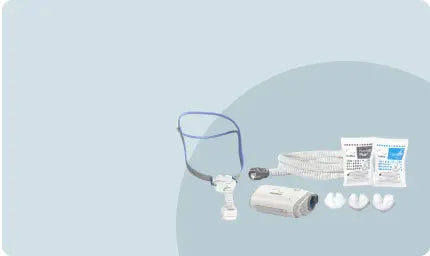Unlocking the Benefits: Understanding CPAP Machines and Their Role in Restful Sleep

Continuous Positive Airway Pressure (CPAP) machines have emerged as a transformative solution for individuals grappling with sleep apnea, a common yet potentially serious sleep disorder. This article aims to demystify the essence of CPAP machines, shedding light on their functionality, benefits, and the pivotal role they play in fostering restful sleep.
Understanding CPAP Machines:
The Essence of CPAP: At its core, a CPAP machine is a medical device designed to address obstructive sleep apnea (OSA). OSA occurs when the muscles in the throat relax excessively during sleep, causing intermittent blockages in the airway. The CPAP machine acts as a continuous and steady source of positive airway pressure, preventing airway collapse and facilitating unobstructed breathing.
How CPAP Works: A CPAP machine comprises three main components: a motor, a mask, and tubing. The motor generates a controlled stream of air, and this air is delivered through the tubing to the mask worn over the nose or both the nose and mouth. The constant pressure exerted by the airflow keeps the airway open, averting disruptions in breathing.
Benefits of CPAP Therapy:
- Improved Oxygen Intake: By ensuring a consistent flow of air, CPAP therapy enhances the intake of oxygen during sleep, addressing the potential risks associated with oxygen desaturation.
- Restoration of Restful Sleep: The uninterrupted airflow allows individuals to progress through various sleep cycles, promoting deeper and more restful sleep.
- Reduced Daytime Fatigue: Effective CPAP therapy alleviates the daytime fatigue and lethargy often experienced by individuals with untreated sleep apnea.
- Enhanced Cognitive Function: Adequate sleep, facilitated by CPAP machines, positively impacts cognitive functions such as memory, concentration, and overall mental acuity.
Indications for CPAP Use:
- Obstructive Sleep Apnea (OSA): CPAP machines are particularly effective in managing OSA, where the airway blockages lead to repeated interruptions in breathing during sleep.
- Central Sleep Apnea (CSA): While less common, CPAP therapy may be recommended for individuals with CSA, a condition characterized by the brain's failure to send proper signals for breathing.
- Complex Sleep Apnea Syndrome: In cases where individuals exhibit a combination of obstructive and central sleep apnea, CPAP therapy may be a suitable intervention.
Personalized Approach to CPAP:
- Mask Varieties: CPAP users can choose from various mask styles, including nasal masks, full-face masks, and nasal pillow masks, catering to individual comfort preferences.
- Adjustable Settings: Modern CPAP machines often feature adjustable settings, allowing users to customize airflow pressure based on their prescribed needs.
CPAP machines stand as guardians of rest, offering a lifeline to those grappling with sleep apnea. By delivering a continuous stream of positive airway pressure, these devices pave the way for restful sleep, improved overall health, and a reinvigorated sense of well-being. As a cornerstone of sleep therapy, CPAP machines continue to empower individuals on their journey to reclaiming the rejuvenating embrace of a good night's sleep.





